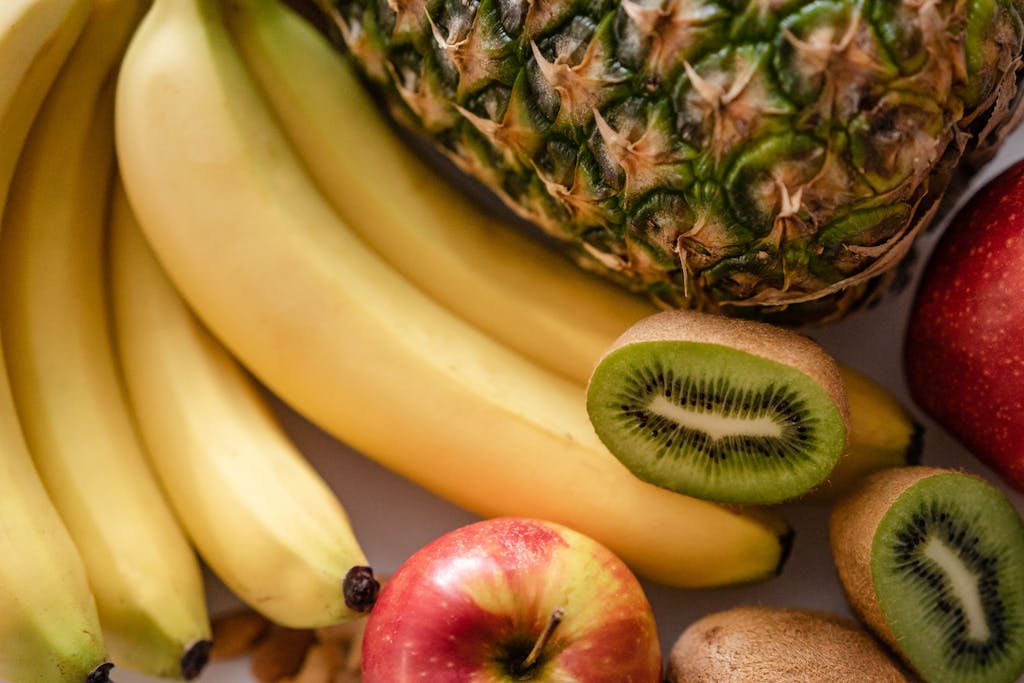The quest for weight loss often leads us down various dietary paths.
One such path gaining popularity is the plant-based diet.
This diet, rich in fruits, vegetables, whole grains, and legumes, is not just a fad. It’s backed by science for its health benefits, including weight loss.
In this article, we delve into the plant-based diet for weight loss. We explore its principles, benefits, and how it promotes weight loss.
We also provide practical tips, including breakfast recipes, and resources like plant-based diet books.
Whether you’re a seasoned vegan, a curious beginner, or someone seeking a healthier lifestyle, this guide is for you. Let’s embark on this journey towards health and wellness together.
Understanding the Plant-Based Diet
A plant-based diet focuses on foods derived from plant sources. This includes fruits, vegetables, grains, nuts, seeds, and legumes.
It’s not just about eliminating animal products. It’s about embracing whole, unprocessed foods that nourish our bodies.
The plant-based diet is flexible. It’s not strictly vegetarian or vegan, although it can be. Some people choose to include small amounts of meat, dairy, or eggs.
The key is to make plant foods the star of your meals. Here are some principles of a plant-based diet:
- Prioritize whole, unprocessed foods.
- Limit or avoid animal products.
- Minimize processed foods and sugars.
- Include a variety of plant foods for balanced nutrition.
Adopting a plant-based diet is a lifestyle change. It’s about making conscious choices for your health, the environment, and animal welfare. It’s a journey, not a destination.
The Science Behind Weight Loss and Plant-Based Diets
Weight loss boils down to creating a calorie deficit. This means consuming fewer calories than your body burns. A plant-based diet can help achieve this without the need for strict calorie counting.
Plant foods are typically lower in calories and higher in volume. This means you can eat larger portions, feel satisfied, and still lose weight.
The high fiber content of plant foods also plays a crucial role. Fiber adds bulk to your meals, slows digestion, and helps you feel full longer. This naturally reduces your calorie intake.
Remember, weight loss is not just about diet. Regular physical activity, adequate sleep, and stress management are equally important. A plant-based diet is just one piece of the puzzle.
Key Components of a Plant-Based Diet for Weight Loss
A plant-based diet for weight loss is not just about eating plants. It’s about choosing the right kinds of plant foods. Whole, unprocessed foods should form the bulk of your diet.
Whole grains, fruits, vegetables, legumes, nuts, and seeds are all excellent choices. They are rich in fiber, vitamins, minerals, and antioxidants. These nutrients support overall health and aid in weight loss.
Protein is another key component. While meat is off the table, there are plenty of plant-based protein sources. These include lentils, chickpeas, tofu, tempeh, and quinoa.
Lastly, don’t forget about healthy fats. Avocados, olives, nuts, and seeds are all good sources. They help keep you satisfied and support nutrient absorption. Just remember to watch your portion sizes, as fats are calorie-dense.
How to Start Your Day: Plant-Based Diet Breakfast Ideas
Starting your day with a plant-based breakfast can set the tone for a day of healthy eating. It’s important to choose foods that are satisfying and nutrient-dense.
Here are a few ideas to get you started:
- Overnight oats with almond milk, chia seeds, and a topping of fresh fruits.
- A smoothie bowl made with spinach, banana, and plant-based protein powder.
- Whole grain toast topped with avocado and a sprinkle of hemp seeds.
- A tofu scramble with a variety of colorful vegetables.
Remember, breakfast is a chance to fuel your body for the day ahead. Make it count.
Plant-Based Diet Recipes for Breakfast
To help you kickstart your day on a healthy note, here are some plant-based diet recipes for breakfast. These recipes are not only delicious but also packed with nutrients.
- Chia Pudding: Mix chia seeds with almond milk and let it sit overnight. Top with fresh fruits and nuts in the morning.
- Quinoa Porridge: Cook quinoa in almond milk, sweeten with a bit of maple syrup, and top with your favorite fruits and seeds.
- Vegan Pancakes: Use oat flour, banana, and plant-based milk to make fluffy, delicious pancakes. Serve with a drizzle of maple syrup and fresh berries.
These recipes should give you a good starting point. Feel free to experiment and find what works best for you.
Overcoming Challenges: Tips and Strategies
Transitioning to a plant-based diet can come with its own set of challenges. However, with the right strategies, these can be easily overcome.
One common challenge is dealing with cravings for non-plant-based foods. It’s important to remember that cravings are normal. Instead of completely ignoring them, try finding plant-based alternatives that can satisfy your cravings.
Another challenge is maintaining a balanced diet. It’s crucial to ensure you’re getting all the necessary nutrients. This can be achieved by incorporating a variety of fruits, vegetables, whole grains, and legumes into your meals. Consulting with a plant-based diet doctor or nutritionist can also be beneficial.
The Role of Plant-Based Diet Doctors and Nutritionists
Plant-based diet doctors and nutritionists play a crucial role in guiding individuals through their dietary transition. They provide personalized advice, ensuring that the diet is nutritionally balanced and tailored to individual needs.
Finding a plant-based diet doctor near you can be a valuable resource. They can help address any nutritional concerns, debunk myths, and provide support throughout your weight loss journey.
Recommended Plant-Based Diet Books for Further Learning
Plant-based diet books can serve as excellent resources for those embarking on this dietary journey. They offer a wealth of information, from scientific research to practical recipes.
A curated list of recommended books can provide further insights into plant-based nutrition and its role in weight loss. These books can help deepen your understanding and equip you with the knowledge to sustain this lifestyle change.
Conclusion: Embracing a Plant-Based Lifestyle for Long-Term Health
Adopting a plant-based diet for weight loss is not just about shedding pounds. It’s about embracing a lifestyle that promotes overall health and well-being.
With patience, consistency, and the right resources, a plant-based diet can become a sustainable and enjoyable way of life. It’s a journey worth embarking on for long-term health benefits.








